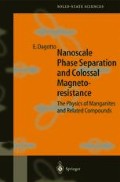Abstract
As emphasized in previous chapters, one of the most severe problems in the field of strongly correlated electrons, including the manganites, is the difficulty theorists encounter to find accurate approximations to handle the many-body Hamiltonians that they themselves write. This leads to the proliferation of a variety of fairly different proposed ground states for the same model Hamiltonian, an issue that often perplexes experimentalists. This problem is not only typical of correlated electrons, say manganites and cuprates, but it appears in other areas of physics where perturbative calculations do not work. For instance, in the context of high-energy physics, this is also a notorious problem, since quarks are confined to form hadrons; an effect that cannot be considered as a perturbation over the kinetic energy portion of the quantum chromodynamics (QCD) Hamiltonian. To attempt to handle these non perturbative QCD effects the area of research known as lattice gauge theories was developed. In general, whenever many particles interact strongly, finding the properties of models associated to those systems is complicated. In previous chapters, we described how numerical techniques can help in alleviating this complication. In this chapter, another quite flexible approach is presented. This time it is mainly analytical, and often works fairly well in establishing the low-temperature phase diagrams, although typically fails in finding critical exponents and other more subtle information. The method is the mean-field approximation, where the influence over a given particle of the rest of the system (the other particles) is in the form of an effective external field that the particle under study feels. Self-consistency allows us to obtain equations for that field, and the mean-field problem can usually be handled exactly or almost exactly. A key assumption of the mean-field technique when applied to electrons in transition-metal oxides is that quantum fluctuations are not too strong.
Access this chapter
Tax calculation will be finalised at checkout
Purchases are for personal use only
Preview
Unable to display preview. Download preview PDF.
References
J.R. Schrieffer, X.-G. Wen, and S.-C. Zhang: Phys. Rev. B 39 11663 (1989); and references therein
H. Koizumi, T. Hotta, Y. Takada: Phys. Rev. Lett. 80, 4518 (1998); H. Koizumi, T. Hotta, Y. Takada: Phys. Rev. Lett. 81, 3803 (1998). See also T. Hotta, Y. Takada, and H. Koizumi- Int. J. Mod. Phys. B 12, 3437 (1998)
T. Hotta, A. Malvezzi, and E. Dagotto: Phys. Rev. B 62, 9432 (2000)
Rights and permissions
Copyright information
© 2003 Springer-Verlag Berlin Heidelberg
About this chapter
Cite this chapter
Hotta, T. (2003). Mean-Field Approximation. In: Nanoscale Phase Separation and Colossal Magnetoresistance. Springer Series in Solid-State Sciences, vol 136. Springer, Berlin, Heidelberg. https://doi.org/10.1007/978-3-662-05244-0_8
Download citation
DOI: https://doi.org/10.1007/978-3-662-05244-0_8
Publisher Name: Springer, Berlin, Heidelberg
Print ISBN: 978-3-642-07753-1
Online ISBN: 978-3-662-05244-0
eBook Packages: Springer Book Archive

